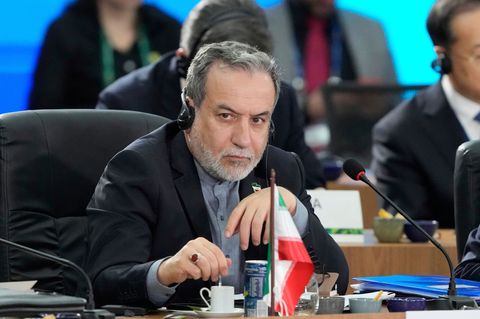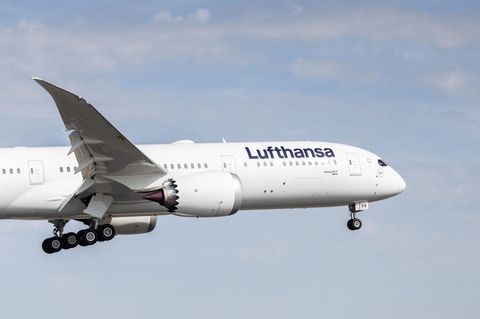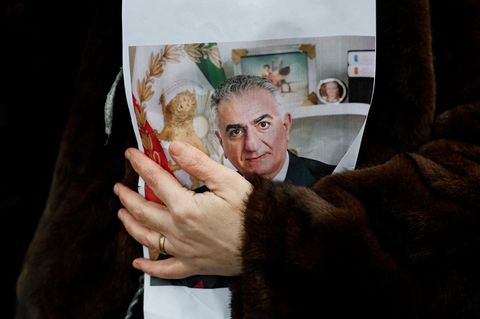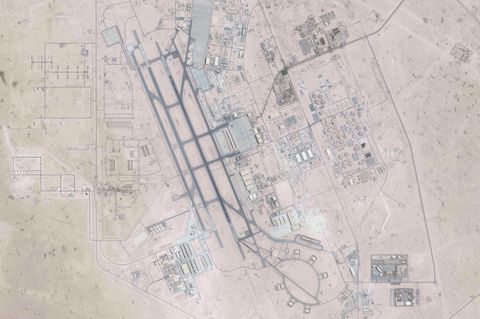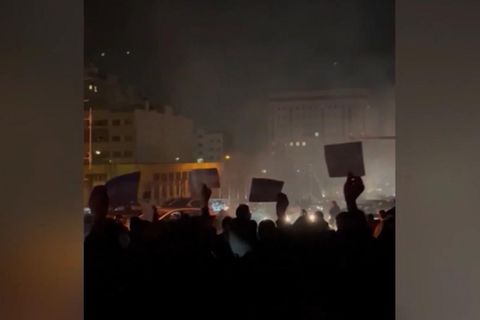Ambassador Khalilzad, time is running out for the US in Iraq. The American people want the troops to leave. Are the United States defeated in Iraq?
We cannot accept defeat. Iraq could pose a security risk to the whole region.
But even leading Republican Senators are now persistently demanding a new Iraq strategy from President Bush.
Some would call it a new strategy, others would call it significant adjustments. The patience of the american people is running out, there's no question about that. And yes, the pressure for adjustments increases.
How do these look like?
In the coming weeks I want to convince the UN to become more active in regards to Iraq. The UN mandate for Iraq will be up for renewal, soon.
At the beginning of August.
Yes. By then, the current special envoy is finishing his term. And this is a good opportunity to give the UN a more prominent and more significant role - with the help of an international mediator. I already discussed this idea with the Secretary General and with some of my collegues in the Security Council.
Did you discuss it with Secretary of State Rice and President Bush as well?
I discussed it with Mrs. Rice and our leadership as well as with several Senators. I can say, the United States support the idea.
But since UN-Ambassador Sergio de Mello was killed in a car bomb attack in Baghdad four years ago the international community is reluctant to take more responsibility for solving the problems of the US in Iraq.
UN-Secretary General Ban Ki Moon supports the idea. And the time to select a new person is now.
Do you already have volunteers on the list?
We need someone capable in terms of stature and experience. Someone who can bring the Iraqi people and regional powers together. The regional neighbours like Turkey, Saudi Arabia and Iran should finally begin to play a constructive role. It is an extraordinary task. And therefore we also need to strengthen and enhance the current UN-Mandate for Iraq.
Why should the world now try to fix what the US had broken?
Because it is based on a cold calculation of interests. Whatever you thought about the war - now it is in the interest of the international community to cooperate. We need to make sure that Iraq moves into the right direction. The developments in Iraq could pose a threat to the region, but also to the whole world. What would happen, if Iraq would fall apart? Or if al-Qaida would take over a part of the country?
President Bush had sent almost 30000 additional soldiers to Iraq. But the new security concept is failing. When will US troops start to withdraw?
The US forces in Iraq are only means to help Iraq to become a stable, democratic country. We always stated, that adjustments would be needed if the situtation changes. I think, we will see a reduction of troops. The President will have to decide about a timeline, in interaction with the Congress.
This Congress demands that the Iraqi goverment fullfills its obligations, the benchmarks. Can you claim any tangible progress?
Overall, elections took place, a constitution has been passed, a government of unity has been formed.
But the most important laws are not getting passed. The law on the distribution of oil revenues or the law on debaathification, to name just two.
I agree, they are hard behind schedule with these critical laws. But it is so extremly difficult to bring together diverging groups to form a nation. It takes a long time. The Europeans should know this better sense than we. Americans are sometimes too impatient. They want results in months or within a few years. But Iraqis have a different sense of time.
Isn't it an illusion to build democray in a country where you find only two mentalities, as Iraqi Prime Minister Nouri al-Maliki stated recently - "conspiracy and mistrust".
It will be very hard. It has to do with the country's history, witth the different sects and the enormous amount of fear. Look at all concepts of revenge for example. Under these circumstances it is very difficult and will take a lot of effort for the Iraqis to come together. They are still not ready to make the deals that are neccessary to make the country work.
Is Iran the ultimate winner of the war in Iraq?
Iran has benefited to a degree from the current situation. Iran wanted Saddam Hussein to be overthrown. They tried to do it themselves. But Iran embarked on a two-track policy: it claims to support the new government in Iraq. But at the same time it helps the opponents of this government and wants to dominate the region. There is a real danger that Iran may overreach. If Iraq collapses, Tehran faces the danger of conflict spreading also into Iran.
Iran seems not to be impressed. It continues working on its nuclear program.
It is not acceptable for the international community, that Iran aquires nuclear weapons or the capability to build them. Iran violates a resolution of the UN-Security Council. What we did so far, did not bring results. Now we discuss further steps, also with Germany. We need to do more. We look at another resolution of the Security Council.
It would be the third. Could there be a military strike, as apparantly favored by some members of the Bush administration?
We are a diverse country, there are all kinds of suggestions. But for now we are in the phase of diplomacy. The European Union foreign policy chief Xavier Solana talks to the iranian leaderhsip. We want to continue that dialogue.
Iran is rising as the leading regional power. Isn't it time for the US to finally sit down at the negotiation table?
We are talking. Directly and bilateraly. On Afghanistan and on Iraq. And we have other channels, the swiss channel for example.
The Swiss Embassy in Teheran represents US interests in Iran. And it is said, that an iranian proposal for broad negotiations had been passed through that back-channel in spring of 2003. But the Bush administration apparently rejected the offer. Is it too late now?
We are not against dialogue. But it should be useful. If Iran suspends its uranium enrichment program, Secretray Rice is ready to sit down at the negotiation table. But there has to be some gesture on the part of the Iranians. And at this point by "suspension" we do not mean that Iran has to end it. For now it means they stop it where they are and then we sit down and talk. This is not a very demanding requirement.
Why should Iran give in? The US is trapped in Iraq, and Iran benefits.
Iran faces enormous economic and internal problems. Other countries in the region are afraid its hegemonic ambitions. All this will only further deterioate if the iranian leadership stays on the current course.
You served as US-ambassador to Teheran. More than five years after the beginning of the Nato mission, the Taliban and al-Qaida are resurging. Is the West about to suffer defeat in Afghanistan?
There has been a lot of concern about civilian casualties. They are very unfortunate. But the Taliban and al-Qaida are hiding behind civilians. They want to create a distance between Nato forces and the afghan people.
But more and more Nato countries fear, that Nato is on a wrong mission in Afghanistan.
We need to understand: The crisis of the Islamic World is the defining geopolitical challenge of our time. Many of our security problems emanate from that region. And we all need to answer the central question: How do we deal with these problems? In the past centuries many of the world's security problems came from Europe. It took a very long time, but today Europe has gotten its act together. Now it is the crisis in the Broader Middle East. We need to shape and contain this area.
Do you now advocate containment like during the Cold War instead of President Bush's "freedom agenda"? Is this the new stratgey?
The problems of this region will not go away. Otherwise they will come to where we are. Or do you think we could build a wall around this region an then have them call us, when they have solved their problems?
You have been one of the leading advocates of regime change. If you look at the chaos in Iraq, do you sometimes feel responsible, maybe even guilty for what happened?
We need to respect the traditional values of the people in this region. But they deserve to live in societies with a rule of law. They deserve to have economical opportunities and to choose their own leaders. During the Cold War the US had sometimes cooperated with dictatorial regimes. But now we have the chance to make the Middle East function for its people. It doesn't have to be done by military means from us. But it requires an incremental, careful approach from our side. We need to extend the democratic zone of peace and prosperity, that we find in Europe, East Asia and North America, to the Broader Middle East. And ultimatley to the world. I continue to believe that this is the ultimate solution. There is no better alternative for people than democray.


